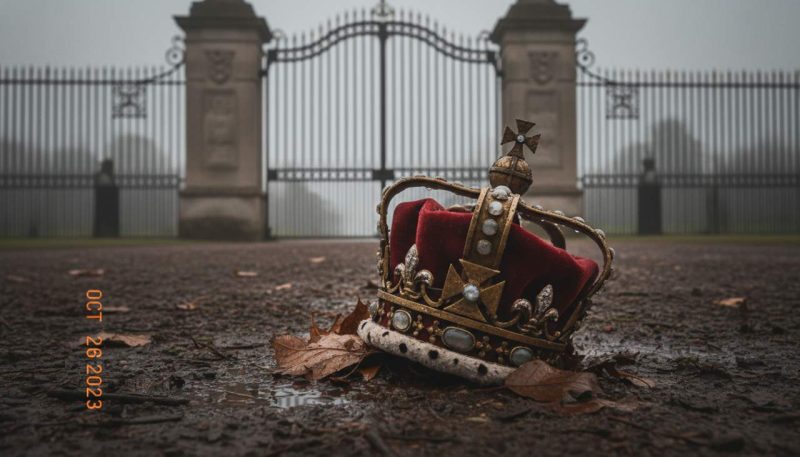
It wasn’t a swift, clean amputation. It was a slow, agonizing excision, performed in public over years. But the final cut has been made. Prince Andrew, once the dashing war-hero son, the spare to the heir, is now just Andrew Mountbatten Windsor.
In a move that feels both shocking and decades overdue, King Charles III has formally begun the process of stripping his younger brother of the titles, styles, and honors that once defined him. He is out. Not just sidelined, but institutionally disowned.
This isn’t merely a family drama playing out in the world’s most famous gilded cage. It is a brutal, calculated act of institutional survival. The House of Windsor, often referred to as “The Firm,” is, at its core, a business. Its product is stability, its currency is public perception, and its biggest liability just got written off the books. The statement from Buckingham Palace was cold, corporate, and clear: Andrew’s continued presence was a distraction from the work. In the unforgiving calculus of modern monarchy, he was bad for the brand.
The timing, of course, is everything. This final severing comes just days before the posthumous publication of a memoir by Virginia Giuffre, the woman who accused Andrew of sexual abuse when she was a 17-year-old being trafficked by Jeffrey Epstein. Giuffre, who died by suicide earlier this year, is getting the last word. Her voice, now from beyond the grave, proved to be the one the Palace could no longer ignore. The monarchy, it seems, can withstand many things, but it cannot withstand the ghost of a victim telling her story, in her own words, on the eve of its publication.
The Slow-Motion Implosion
Let’s be clear: this was not a sudden fall from grace. It was a steady, grinding descent into ignominy. For years, Andrew’s association with the convicted sex offender Jeffrey Epstein was an open secret, a festering wound the Palace chose to cover with the flimsy bandage of royal protocol. He flew on Epstein’s private jet, the “Lolita Express.” He stayed at Epstein’s private island. He was photographed with his arm around a teenage Virginia Giuffre.
The excuses were always paper-thin, insulting to the public’s intelligence. But the institution closed ranks, as it always does. The true breaking point was Andrew’s catastrophic 2019 BBC Newsnight interview. It was a masterclass in self-immolation. In a performance of staggering arrogance and zero empathy, he offered up bizarre, easily disprovable alibis involving provincial pizza parlors and a peculiar inability to sweat. He didn’t just fail to clear his name; he doused himself in gasoline and lit the match.
That interview shattered the illusion that this could be managed. It revealed a man profoundly out of touch, not just with public sentiment, but with reality itself. It was then that Queen Elizabeth II, in one of her final acts of monarchical damage control, began the process of stripping him of his military titles and patronages. But her death left the final, messy task to her son, the new King. Charles, obsessed with the idea of a slimmed-down, modern monarchy, saw his brother not as family to be protected, but as a toxic asset to be liquidated.
What It Means To Be “Out”
So what does this actually mean? Andrew is still a prince by birthright; that cannot be taken away without an act of Parliament, a constitutional crisis the government has no appetite for. He remains, almost comically, eighth in the line of succession to the throne. But in every practical sense, he has been erased.
He will no longer be addressed as “His Royal Highness.” The titles of Duke of York, Earl of Inverness, and Baron Killyleagh are gone. He is being forced to vacate his longtime home, the sprawling Royal Lodge in Windsor, for more modest private quarters. His ex-wife, Sarah Ferguson, who bizarrely continued to live with him, will also no longer use her Duchess of York title. The message is unequivocal: you no longer represent us.
This is a profound statement about the shifting power dynamics between ancient institutions and modern accountability. The monarchy has survived for a thousand years by being ruthlessly adaptable. It understands, in a way Andrew clearly never did, that its power is not divine but derived from the consent of the public. And the public, in the 21st century, will not consent to a prince credibly accused of involvement in a sex trafficking ring.
The move also serves as a stark warning. It draws a bright line around the institution, separating the Crown from the man. It is Charles’s attempt to cauterize the wound, to tell the world that the rot was with the individual, not the system. But that is a harder argument to make. The system, after all, protected him for decades. The system used taxpayer money and royal privilege to shield him from scrutiny. The system is what allowed him to believe, as Giuffre wrote in her memoir, that sex with a trafficked teenager was his “birthright.”
This isn’t the end of the story. It is the end of Prince Andrew. The questions he leaves in his wake, however, will linger. Questions about wealth, power, and impunity. Questions about whether an institution built on inherited privilege can ever truly be accountable. The Firm has cut its losses, but the stain remains.
